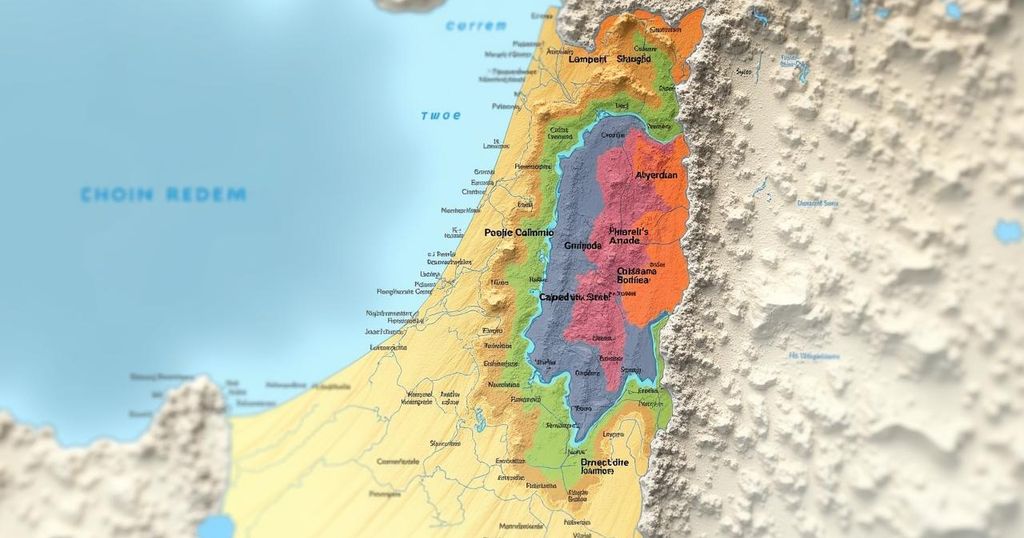Israeli Finance Minister Bezalel Smotrich has called for an expansion of Israel’s borders to extend to regions beyond current territories, articulating a vision for ‘Greater Israel’ that includes parts of Syria, Iraq, and Saudi Arabia. His statements highlight the growing acceptance of expansionist ideologies among right-wing Israeli leaders, coinciding with an ongoing humanitarian crisis in Gaza resulting from intensified military actions since October 7, 2023.
In a recent interview for the documentary “Israel: Extremists in Power,” Israeli Finance Minister Bezalel Smotrich articulated a vision for expanding Israel’s borders significantly. He suggested that Israel should extend its territory to the Jordan River, Damascus, and as far as Iraq and Saudi Arabia. This assertion reflects the ambitions of the far-right factions within the Israeli government to realize the controversial ‘Greater Israel’ project. Smotrich stated, “I want a Jewish state… that operates according to the values of the Jewish people,” emphasizing his desire for territorial expansion, which he affirmed by stating that the future of Jerusalem involves reaching Damascus. The documentary narrator pointed out that Smotrich’s vision encompasses not only Palestinian lands but extends into territories of Jordan, Syria, Lebanon, Iraq, Egypt, and even Saudi Arabia, framing this viewpoint as an extreme yet increasingly accepted part of public discourse in Israel. Support for this expansionist ideology has been bolstered by other Israeli leaders as well. Prime Minister Benjamin Netanyahu, at a recent United Nations General Assembly session, displayed maps that integrated the West Bank and Gaza into the state of Israel. Following the significant escalation in violence in Gaza since October 7, expressions of support for the ‘Greater Israel’ notion have surged across various media platforms. The ongoing conflict has led to alarming casualties and displaced vast populations within Gaza, where, according to official reports, over 42,000 Palestinians have lost their lives and many more have been injured since October 7. With around two million individuals displaced, mainly towards the southern city of Rafah, the humanitarian crisis continues to escalate, exacerbated by acute famine conditions affecting primarily women and children. The situation is further intensified by international concerns over alleged genocide, as Israel faces scrutiny before the International Court of Justice. Beyond the territorial ambitions, the dire humanitarian implications of the Israeli-Palestinian conflict underscore the urgent need for international dialogue and intervention to achieve lasting peace and stability in the region. Overall, the ambitions for a ‘Greater Israel,’ highlighted by leadership figures, raise profound concerns regarding the impacts on Palestinian rights, regional stability, and the historical injustices faced by those in occupied territories.
The concept of ‘Greater Israel’ encompasses historical visions that extend beyond Israel’s current borders to include significant portions of neighboring territories inhabited by Palestinians and other Arab populations. This notion has resurfaced amidst ongoing conflicts, particularly following the escalation of violence in Gaza since October 2023. As leaders advocate for these expansive territorial claims, the implications for peace, security, and humanitarian conditions in the region have become increasingly critical. Israeli forces have faced international condemnation for their military actions in Gaza, described by many organizations as genocidal. This context has created a charged atmosphere where discussions surrounding territorial integrity and the rights of Palestinian people are pivotal.
The push for the ‘Greater Israel’ project, articulated by prominent Israeli officials, represents a significant escalation in territorial ambitions that could further distort the delicate fabric of Israeli-Palestinian relations. With the humanitarian crisis deepening in Gaza, marked by widespread devastation and displacement, the need for a reevaluation of policies and a commitment to peace becomes increasingly paramount. The world watches as these dynamics unfold, urging for avenues toward constructive dialogue and resolution.
Original Source: www.palestinechronicle.com






